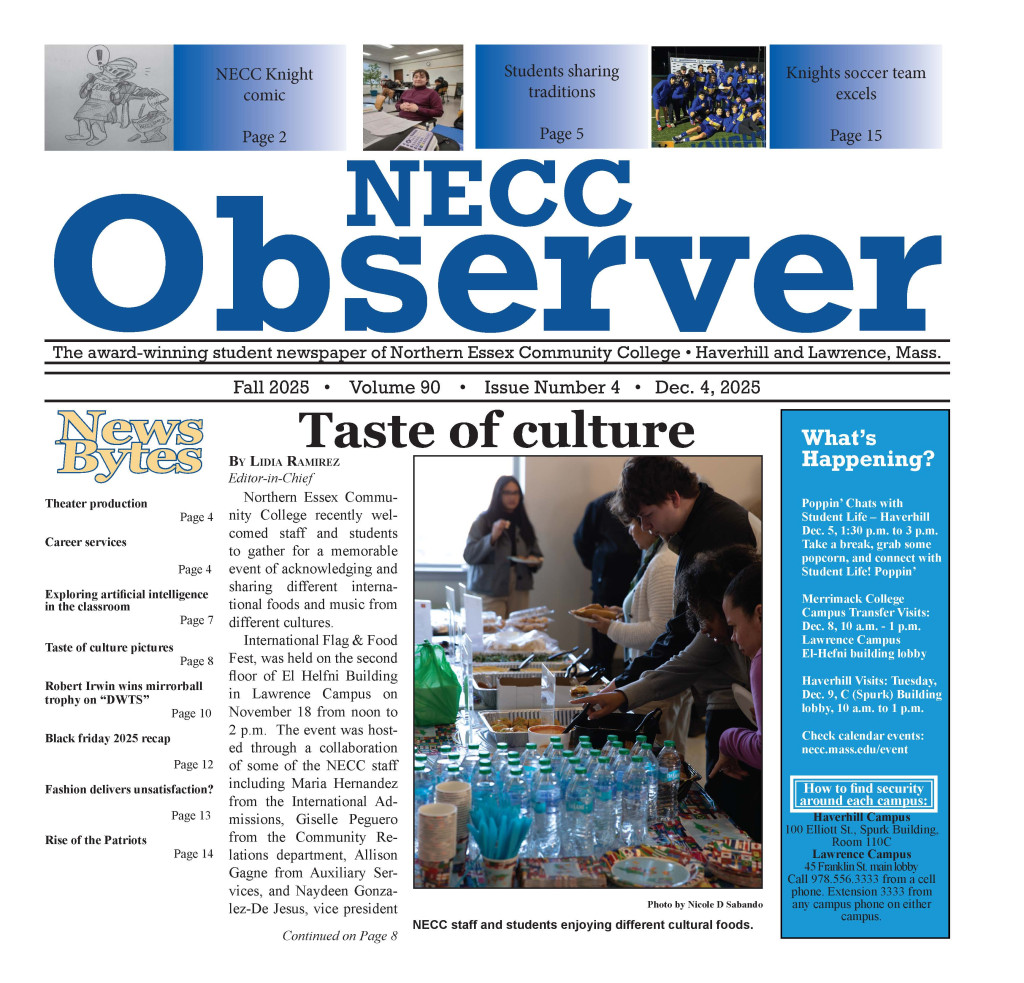Poet Tom Sexton shared his insights with students
Parnassus literary magazine founder 78-year-old Tom Sexton spoke to a gathering of students and faculty Nov. 8 in the Top Notch Theater.
“It’s a delight to be back” Sexton says as he pulls out his own first copy of Parnassus, published 53 years ago. Sexton jokes about it being worth a large sum of money now and instead of opening the reading with his own poem he reads the work of fellow editor Raymond St Amand. He praised him as the real talent. The audience was curious about what happened to St Amand but Sexton had no idea where his co-editor ended up.
The pair started Parnassus literary magazine in 1965 when Sexton was a student at NECC. After graduating from Salem State University, he moved to

Alaska where Sexton earned his MFA in English from the University of Alaska at Fairbanks before moving on to create and teach the MFA program at the Anchorage campus.
While teaching in Anchorage he once again became a founding editor of another literary magazine Alaska Quarterly Review.
While Parnassus has achieved award winning status taking home many first place prizes, Alaska Quarterly Review is described by Michael Dirda of The New York Review of Books, as “one of [the] best, and most imaginative, literary magazines.”
Recently, Alaska Quarterly Review was featured in the latest issue of Poets & Writers magazine. Roland Spatz, co-founder and editor of the magazine talked about the impact digital submissions have had on the amount of submissions that magazines receive each year.
As a trial, for one month Alaska Quarterly Review opened up a Submittable account to accept submissions digitally. Up until that point they had only accepted submissions by snail mail. Spatz assumed he would receive a few hundred more submissions than usual but instead he received more than 1,190 submissions in addition to the regular postal submissions for that month.
The magazine was so overwhelmed by the amount that they had to close submissions and are back to paper submissions only until they can hire enough staff to keep up with the digital demand.
“We think it’s really, really important to reach this younger demographic.” Spatz was quoted in Poet’s & Writer’s magazine “We’re talking about a lot of folks who are at the cutting edge, and they really are the future.”
After Sexton read some of the work in the new issue of Parnassus he told one student,
“You do have a voice, and that’s 99 percent of the battle.”
His advice to budding writers is to keep working and trying new ways of finding their voice and style until they are comfortable with it. When he talked about his poem from the first edition of Parnassus he hints that it wasn’t his style or authentic voice but after writing poems and teaching for 50 years, he can recognize the difference in his work.
Sexton notes that self-evaluation is an important part of being successful at achieving that voice “I don’t mean about being published in a big magazine,” He says.
Instead he encourages students to trust their own instincts about their work “You know when you’ve done something worthwhile.”
Yet, being published in a literary magazine is a big opportunity for many writers trying to find their way, as it was for Paul Marion, editor of Loom Press. Marion made the trip to NECC to hear his friend Sexton read.
Marion published Sexton’s “Bridge Street at Dusk” in 2012, but his first contact with Sexton was when Marion, sent his own work to Alaska Quarterly Review while Sexton was the still the poetry editor there.
“He accepted one of my poems” Marion says. “To get into a prestigious academic journal or university quarterly like Alaska Quarterly Review is important in establishing credibility as a writer.”
And while Alaska Quarterly Review only receives paper submissions, Parnassus only accepts emailed submissions and is on the hunt for new work. Fliers have been posted on campus reminding NECC students that the deadline for submissions is Dec. 7.
Students can submit multiple times in all categories by clicking on www.parnassuslitmag.com and following the instructions.
Even though Parnassus is only open for submissions by current students and faculty of NECC it is available online in a digital form reaching a nationwide audience. Anyone can see this work. Tom Sexton started with Parnassus and went on to publish 10 collections of poetry, and that was when Parnassus was just a tiny little book read on campus.

